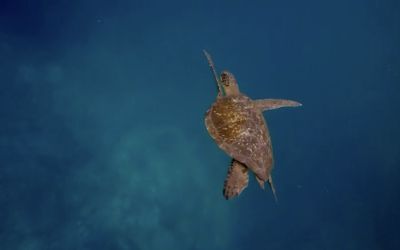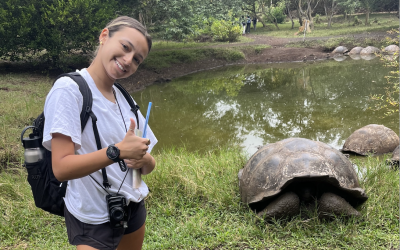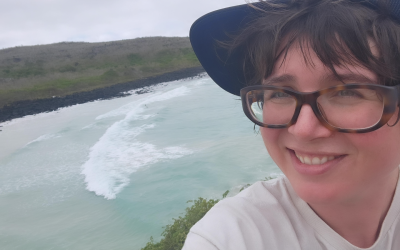GALAPAGOS STUDIO ON SOCIO-ECOLOGICAL INTERACTIONS
- Landscape Architecture Students (LA 488/588): Participants from the Landscape Architecture program can earn 6 University of Oregon credits through this course. These credits are applicable towards a 400/500 level studio course in their program.
- Public Policy, Planning, and Management Students (PPPM 488/588): Students in the Public Policy, Planning, and Management program can enroll in this course for 6 University of Oregon credits.
- Environmental Design (ENVD 488): Students in the ENVD program can enroll in this course for 6 University of Oregon credits. The ENVD department will work with each student to figure out how it will work with their track choice.
- Environmental Studies and Environmental Science (ENVS/ESCI 488/588): Students in the ENVS or ESCI majors or ENVS minor can enroll in this course for 6 University of Oregon credits. These credits will count as one Area 3B Design Foundation course. Graduate students should reach out to the ENVS Director of Graduate Studies to discuss how this will count towards their degree.
- Architecture: The Department of Architecture recognizes this studio course as a valuable life and educational experience. While it will not fulfill any studio course requirements for the Architecture major, it provides students with an opportunity to expand their knowledge and skills in complementary areas. Participants can receive upper-division elective credit and should meet with an academic advisor prior to confirming attendance to determine how these credits would best satisfy University and Department requirements.
Course taught in English.
The Galapagos Studio is an academic endeavor that takes into consideration urban growth in protected natural areas, using the Galapagos Archipelago as a case study. The Galapagos Islands are one of the most delicate natural areas in the world, declared a natural heritage site by UNESCO in 1978 for its outstanding universal value. Declared the first tourist destination by USA Today magazine, it is a place that is undergoing a process of urbanization that expands every year. The aim of the studio is to research the role that the built environment plays in the process of nature preservation, considering the border conditions between colonized areas, urban and rural areas, and protected areas. Working directly with local governments, the studio proposes different approaches as options for the processes that urban settlements are currently following.
The studio takes place for a couple of days in Quito, the capital of Ecuador and the first Cultural Heritage of the world, and the rest of the time in the Galapagos Islands. The studio includes three weeks of master classes with invited professors from recognized universities, conferences given by experts in the fields of biology, ecology, and conservation of the Galapagos, city tours in the islands, walking tours to natural tourist areas, and all the digital and paper information needed for the proper development of the course.
Students will be confronted with the task of a proposal-based research; experimentation must not come from personal, philosophical, or ethical interpretations but must be of a general nature, useful for the social and natural environment of the Galapagos and follow a precise and systematic procedure. The course will follow a studio format in which students collaborate to explore potential solutions to a given problem. Proposals will be discussed with the professor, and the entire group will collectively explore various alternatives to identify the most efficient ones.
Course Objectives:
- To understand the significance of the built environment and spatial design in a vulnerable natural ecosystem.
- To respect the natural environment in terms of urbanity, architecture, culture, and the day-to-day way of life.
- To collaborate among a group of individuals with diverse cultural and geographic backgrounds and experiences.
- To address contexts and environments different from what one is normally accustomed to.
- To propose design solutions to address socio-ecological problems in one of the most delicate natural areas in the world.
Learning Outcomes:
- Detect and analyze the factors that unbalance the relationships between urban spaces and protected natural areas.
- Develop awareness of the impact produced by urban settlements adjacent to protected natural areas.
- Develop unconventional alternatives to improve relationships between the ecosystem and the inhabitants of the islands.
- Develop capabilities to research and work in a multidisciplinary manner with groups of different professional and academic backgrounds.
The workshop includes a reference introduction to the Galápagos context, consisting of shared documents, videos, and lectures given by specialists in the urban and natural context of the islands. Subsequently, exercises approaching the urban environment of the two most populated islands in the archipelago will be proposed. Finally, the work done by students will be presented to the island community and Galápagos authorities.





